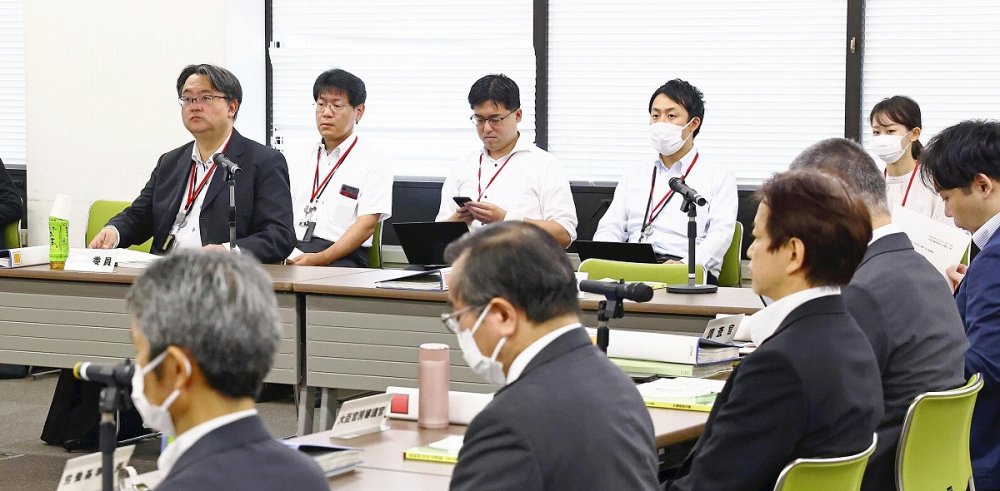
Members of a subcommittee of the Central Minimum Wage Council are seen at a meeting in Tokyo on Friday.
15:18 JST, July 29, 2023
Friday’s decision by a government advisory panel to raise the national average minimum wage by a record ¥41 — bringing it to the ¥1,000-level for the first time — could pose challenges for small and midsize firms.
The decision by an advisory panel to the labor minister was apparently made in consideration of Prime Minister Fumio Kishida’s goal of reaching the landmark figure. Challenges lie ahead, however, including the issue of how to support the many enterprises that will have to bear higher labor costs.
“We somehow managed to achieve our target,” a senior labor ministry official said Friday, following a subcommittee meeting of the Central Minimum Wages Council, an advisory panel to the Health, Labor and Welfare Minister.
Increases in prices, wages, and other factors were taken into consideration when determining the size of the hike.
Since last September, the consumer price index, which excludes fresh food, has risen more than 3% year-on-year for 10 consecutive months. Meanwhile, the average wage hike in this year’s spring labor-management negotiations was 3.58%, marking a 30-year high.
Using these circumstances as a tailwind, the labor side demanded a ¥47 (4.9%) increase from the current national average of ¥961.
Conversely, the employers’ side called for holding the increase to around ¥20, based on this year’s wage increase rate of 2.1% for workers at smaller firms.
The national average minimum wage rose by ¥212 over the decade until the end of last fiscal year. Employers expressed concern that “overly boosting wages might lead to an increase in the number of companies forced to fold.”
The national average rise for last fiscal year was 3.3%. The subcommittee pointed out that some consumer price indexes had increased by over 4% on average since last fall, noting that “minimum wages must exceed consumer prices to a certain degree.” It ultimately concluded that a hike of 4.3% — 1 percentage point higher than last fiscal year — would be appropriate.
In consideration of employers, the subcommittee’s report, which was compiled Friday, called on the government to provide support for small and midsize enterprises, including measures to allow increased labor costs to be reflected in higher sales prices.
The Kishida administration played a key role in the minimum wage rising to the ¥1,000-level threshold. The Basic Policy on Economic and Fiscal Management and Reform approved by the Cabinet in June, states that “the issue of raising the minimum wage, including the achievement of a national average of ¥1,000, should be taken up for discussion at the council.”
Kishida has put priority on elevating the minimum wage, viewing the issue on a par with measures to combat the nation’s low birthrate.
“Politics had a strong impact on the minimum wage-related discussions,” a senior labor ministry official said.
However, smaller businesses, many of which act as subcontractors for larger companies, may find it difficult to pass on higher labor costs via their sales prices.
Commenting on the minimum wage increase, Ken Kobayashi, chairman of the Japan Chamber of Commerce and Industry, said, “Many small and midsize enterprises have been rocked by soaring prices for raw materials and energy, making it vitally important to help such firms pass on increased labor costs through their sales.”
Top Articles in Business
-

Prudential Life Insurance Plans to Fully Compensate for Damages Caused by Fraudulent Actions Without Waiting for Third-Party Committee Review
-

Narita Airport, Startup in Japan Demonstrate Machine to Compress Clothes for Tourists to Prevent People from Abandoning Suitcases
-

Japan, U.S. Name 3 Inaugural Investment Projects; Reached Agreement After Considerable Difficulty
-

Toyota Motor Group Firm to Sell Clean Energy Greenhouses for Strawberries
-

SoftBank Launches AI Service for Call Centers That Converts Harsh Customer Voices into Softer Voices
JN ACCESS RANKING
-

Japan PM Takaichi’s Cabinet Resigns en Masse
-

Japan Institute to Use Domestic Commercial Optical Lattice Clock to Set Japan Standard Time
-

Israeli Ambassador to Japan Speaks about Japan’s Role in the Reconstruction of Gaza
-

Man Infected with Measles Reportedly Dined at Restaurant in Tokyo Station
-

Videos Plagiarized, Reposted with False Subtitles Claiming ‘Ryukyu Belongs to China’; Anti-China False Information Also Posted in Japan





















